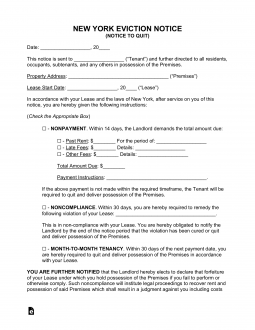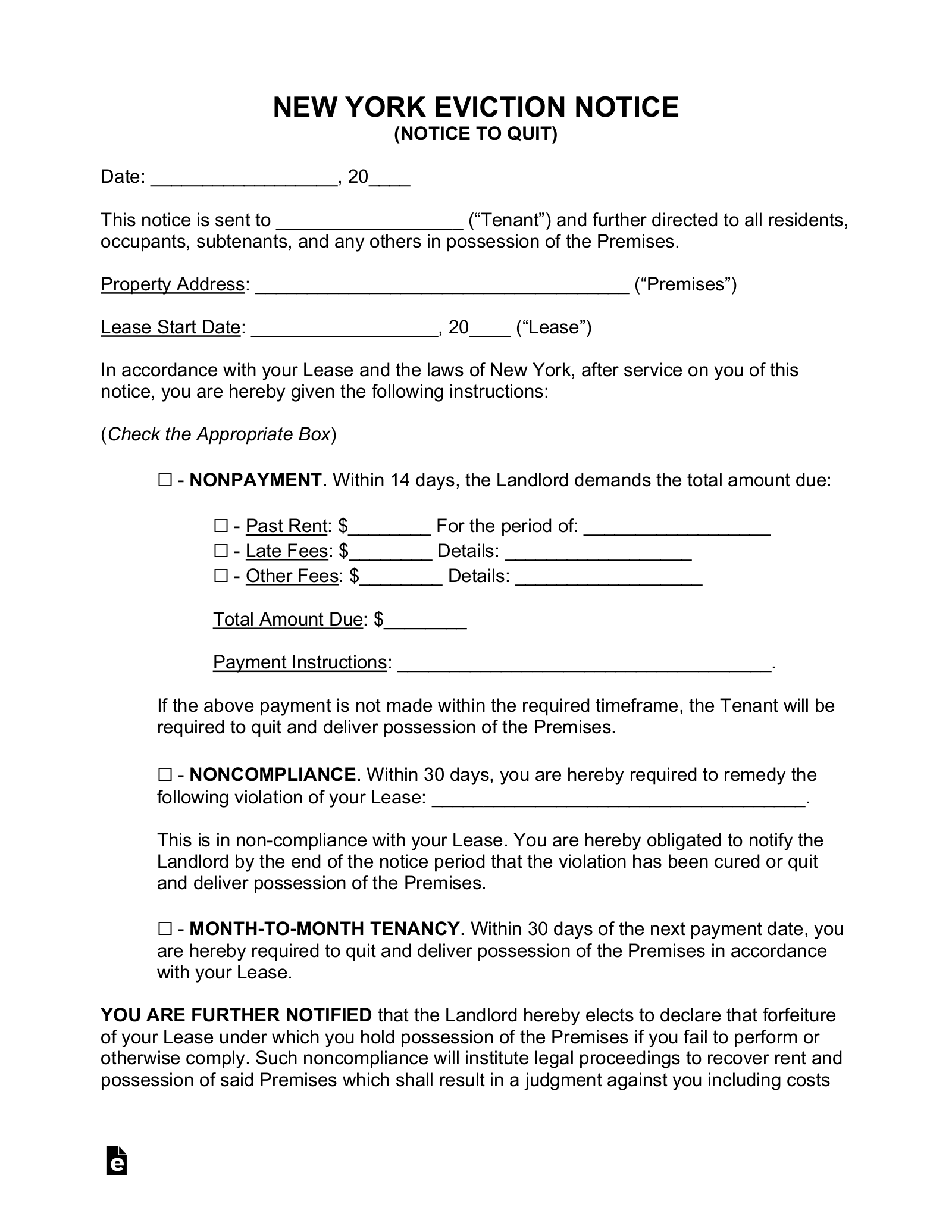Updated March 11, 2024
A New York eviction notice is a form used when a tenant has either failed to pay rent or violated the terms of their rental contract. The notice acts as a warning to the tenant that if they do not adhere to its terms within the given timeframe, an eviction lawsuit will be filed.
By Type (3)
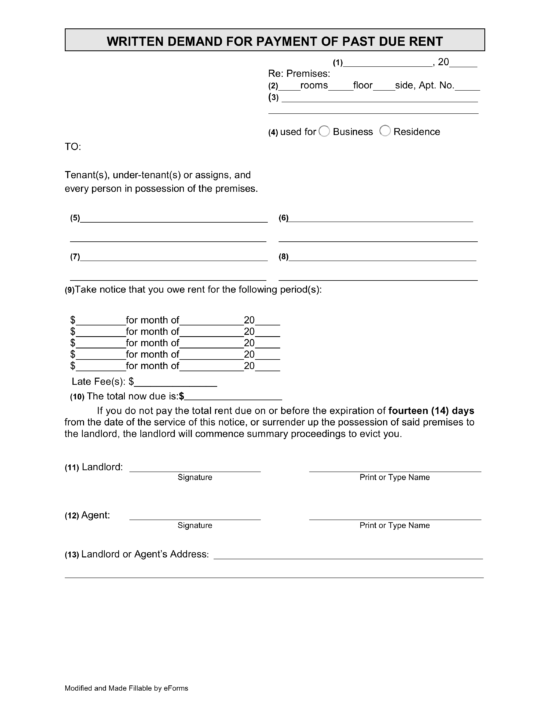 14-Day Notice to Quit (Non-Payment of Rent) – Used when the tenant fails to pay the rent due. The tenant will have 14 days to respond before the landlord can file a petition with the court. This form is also known as a “Demand for Rent.” For additional help, use the Guide for Non-Paying Tenants. 14-Day Notice to Quit (Non-Payment of Rent) – Used when the tenant fails to pay the rent due. The tenant will have 14 days to respond before the landlord can file a petition with the court. This form is also known as a “Demand for Rent.” For additional help, use the Guide for Non-Paying Tenants.
Download: PDF |
 30-Day Notice to Quit (Non-Compliance) – Used when the tenant breaches a lease term. The tenant will have 30 days to respond before the landlord can go to court. 30-Day Notice to Quit (Non-Compliance) – Used when the tenant breaches a lease term. The tenant will have 30 days to respond before the landlord can go to court.
Download: PDF, MS Word, OpenDocument |
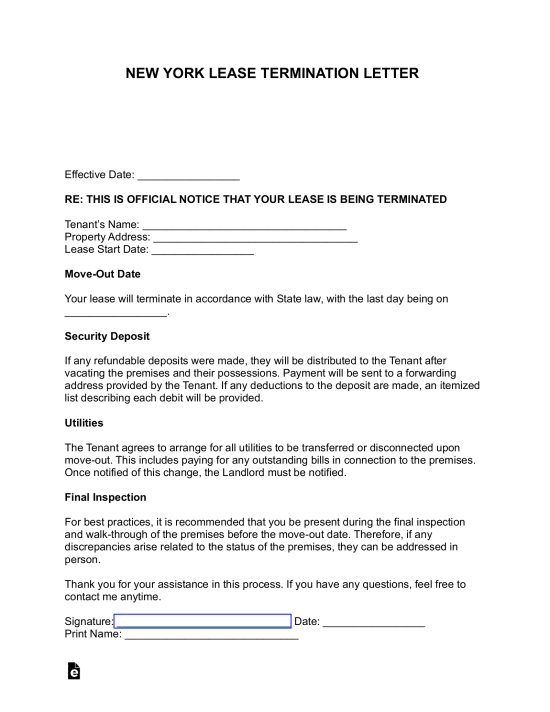 30-Day Notice to Quit (Month-to-Month Tenancy) – Used by either the tenant or the landlord to notify the other party that they intend to end the month-to-month lease after 30 days. 30-Day Notice to Quit (Month-to-Month Tenancy) – Used by either the tenant or the landlord to notify the other party that they intend to end the month-to-month lease after 30 days.
Download: PDF, MS Word, OpenDocument |
Table of Contents |
Prohibited Landlord Acts
Utility Shutoff – It is unlawful for a landlord to disrupt or terminate a tenant’s access to essential services as a means to kick them out of the dwelling unit.[8]
Changing the Locks – It is unlawful for a landlord to prevent a tenant from accessing a dwelling unit by changing the locks, removing the door, or other similar means.[9]
Court Forms
Landlord Non-Payment Eviction Petition & Written Rent Demand Program (See the New York City Version) – This online resource can be used by landlords to complete and print out an eviction petition. For the landlord to open a claim against a tenant, the finished document must be filed with the local court.
How to Evict a Tenant (5 steps)
- Give Notice to the Tenant
- Make an Eviction Filing
- Serve Papers on the Tenant
- Attend Court Hearing
- Use Warrant for Legal Possession If Necessary
1. Give Notice to the Tenant

Before a landlord can go to court, they must provide the required notice to the tenant by choosing one of the following forms:
- 14-Day Demand For Rent – For the late rent.
- 30-Day Notice – For any lease violation other than rent-related.
- 30-Day Notice (Terminate a Month-to-Month Lease) – To end a month-to-month lease.
2. Make an Eviction Filing

If the tenant fails to comply and continues to breach the lease, the landlord may file a Petition with the local city, village, or town court if the property is outside of New York City, or with the Housing Court if the property is inside New York City. They must pay a filing fee of $50.[10]
Most forms must be notarized before they can be filed with the court.
3. Serve Papers on the Tenant

Once the landlord has finished filing with the court and has chosen a court date, they must serve the papers to the tenant. (Use this NY Courts guide as a reference.)
4. Attend Court Hearing
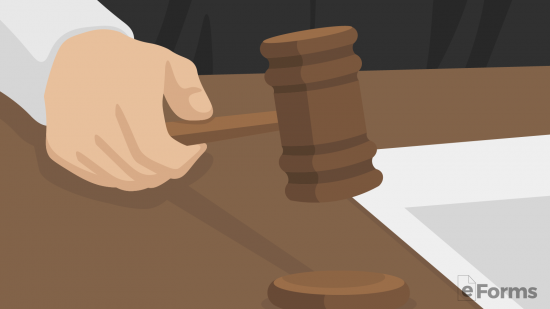
The tenant will have a chance to show up at court and dispute the matter, or not show up. In either case, if the landlord receives a judgment in their favor, the tenant must move out of the unit. To receive help from the sheriff, the landlord must obtain a Judgment and a Warrant for Eviction.
5. Use Warrant for Legal Possession If Necessary

Once the Judgment and Warrant for Eviction are signed, the landlord or the sheriff’s office will be required to give the Notice of Eviction. After the tenant receives it, they will have 72 hours to move out before they are forced out.
If the tenant is still on the property, the sheriff can use the warrant and forcibly take possession of the property after the 72-hour period expires.
Sources
- N.Y. Real Prop. Acts. Law § 711(2)
- N.Y. Real Prop. Acts. Law § 753(4)
- N.Y. Real Prop. Acts. Law § 711(5)
- N.Y. Real Prop. Acts. Law § 715(1)
- N.Y. Real Prop. Acts. Law § 232-a
- N.Y. Real Prop. Acts. Law § 232-b
- Article 7 (Summary Proceeding to Recover Possession of Real Property)
- NYC Admin Code § 26-521(2)
- NYC Admin Code § 26-521(3)
- NYCourts.gov – Filing Fees

